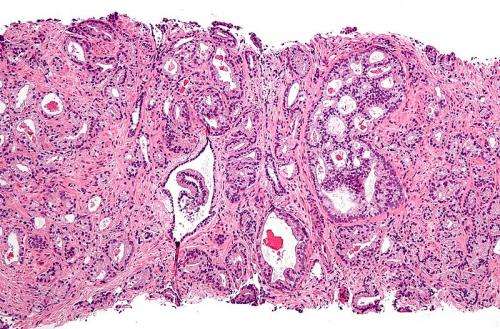Prostate cancer testing is on trial

(Medical Xpress)—The University of Sydney's School of Public Health is seeking people to participate in a "community jury" to independently asses the process of Prostate Specific Antigen (PSA) testing in Australia.
The PSA test is often used to test healthy men to see whether they have prostate cancer. However, experts disagree about whether, when and how the PSA test should be used for this purpose.
Chief investigator of the study, Associate Professor Stacy Carter, said this study is important because although many men are concerned about prostate cancer, the messages they receive can be confusing.
"Our research team is calling out for participants to be part of a community jury to consider how men and their GPs should approach PSA testing," she said.
"We will present the current evidence and then ask people to consider, debate and decide the best way to manage PSA testing for prostate cancer in otherwise healthy men.
"Those arguing for the PSA test say it can save men's lives and may prevent problems from development of primary and secondary tumours. Those arguing against it say it leads to many men being unnecessarily harmed.
"Because of this genuine disagreement over the merits of the PSA, men and their GPs are in a difficult position when trying to decide what to do."
The PSA test measures the blood level of PSA, a protein that is produced by the prostate gland. Although a higher PSA level may indicate a higher risk of prostate cancer, there are other, non-cancer related reasons for having an elevated PSA level. And some men who have prostate cancer do not have elevated PSA.
"Prostate cancer is a fatal disease for a minority of men and the PSA test is intended to identify the cancer early so that it can be treated and prevent life-threatening disease," Associate Professor Carter said.
"But there is a disagreement about whether screening is beneficial as many men can have prostate cancer diagnosed but not experience physical symptoms or difficulties. This means detecting prostate cancer early will not necessarily reduce the chance of dying from prostate cancer.
"The concern about the PSA is that the test can provide false positive results, as well as false negative results. It can also lead to over-diagnosis (detecting tumours that aren't life threatening) and over-treatment (treating tumours that aren't life threatening).
"Overtreatment exposes men unnecessarily to the potential complications and harmful side effects of treatments for early prostate cancer, including surgery and radiation therapy. The side effects of these treatments can include urinary incontinence, problems with bowel function, and erectile dysfunction.
"This project aims to answer what the moral obligations of GPs are in respect to PSA testing, and what should constitute informed consent to perform a PSA test.
"We are recruiting participants for a series of community juries to consider this problem. A community jury is like a jury in a court room. Expert witnesses present evidence and information, and then the jury debates and comes to a conclusion.
"We are keen to involve all sorts of people of voting age: older and younger, men and women.
"We will be running four separate juries, in July, August and October at the University of Sydney in Camperdown. Research has shown that people who participate in a community jury find it a highly rewarding experience," Associate Professor Carter said.
This project is part of a larger study examining the role of values, ethics, and evidence in cancer screening policy and practice. It is a collaborative initiative involving academics from the University of Sydney's School of Public Health, Centre for Values, Ethics and the Law in Medicine, University of Notre Dame's School of Medicine, Cancer Council Australia, and the SAX Institute.














